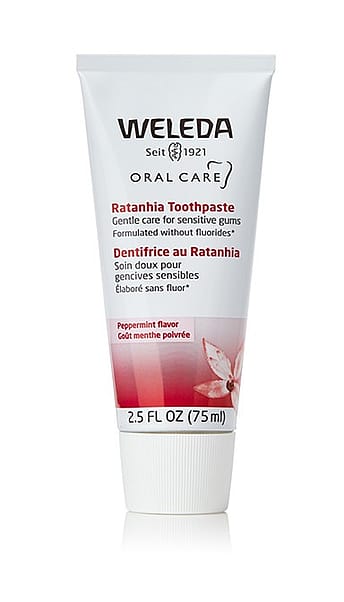Ethical Sourcing Ratanhia
Used in Weleda’s NATRUE certified natural oral care products, the ratanhia plant is sustainably collected from the Andes in Peru.
Sustainably sourced ratanhia from the Andes – Used for oral care
Ratanhia (krameria lappacea) is an inconspicuous, bushy plant that grows in the arid landscapes around the city of Arequipa in southern Peru. In the harsh climate of the Andes range, the ratanhia thrives. Its spreading, branched root system serves as protection against erosion of thin, dry mountain soil. The plant has played an important role for Weleda’s dental care products for over 50 years and is sustainably harvested in the wild.
Originally, our partner’s focus was on the potential to cultivate the wild plant. Botany Professor, Fatima Caceres, from the University of Arequipa and German researchers, Prof. Dr. Max Weigend and Nicolas Dostert, launched a Public Private Partnership project to research whether ratanhia could be successfully propagated and grown. The first research phase, lasting until 2006, showed that cultivation of the plant is out of the question for two reasons: it thrives only in interaction with host plants, withdrawing their water and nutrient salts, and cultivation would require additional plant species in open fields, almost impossible in practice. Ratanhia’s specific biology presented the hurdle: it grows extremely slowly, taking between 7 and 15 years to become large enough even for the first harvest. In the end, the investment and the maintenance effort in the field would be complex and impractical.
Under pressure from global markets
Weleda has also had to overcome another problem. As ratanhia is valued in the global market for beneficial plants, it is at high risk. In the world market, at least 70,000 plant species are used with a harvest of 455 lbs of plants per year. The trade is a massive and challenging effort, so Weleda sought other options.
According to official figures, Peru exports around 40 tons of ratanhia a year, one ton of which goes to the Weleda Group. In 2002, Weleda decided to enter into a broad-based cooperation agreement to set up a sustainable procurement project with the conservation authority ‘INRENA’, scientists, collectors, dealers and the German ‘Gesellschaft für Internationale Zusammenarbeit’.
A sanctuary for wild plants
With this cooperation, it was possible to create a sanctuary of almost 5,000 acres in the Arequipa region for the sustainable wild collection of plants. A plant inventory was created using three sample plots, in order to intensively explore the natural regeneration and annual growing patterns of ratanhia. Findings from these studies helped lay the foundations for a sustainable collection strategy. Initially, only parts of the root were to be harvested, but researchers and Weleda’s plant buyers gradually developed a remarkably simple method that allowed them to increase production. The collection area was divided into five sectors, in each of which every fifth plant could be harvested with their roots. As they harvest, the collectors also plant ratanhia seeds in the disturbed earth to ensure the continued regrowth of seedlings. Long-term observation and analysis shows us that this targeted regeneration of the plant population works well, and protects the future of the plant.
This project in which Weleda has now collaborated for almost 10 years with its German and Peruvian partners secures the ratanhia that is so important for Weleda’s dental care products. The ratanhia is collected in accordance with sustainable collection concepts and is processed in Europe. The collectors receive an agreed and fair wage, which assures them of an important extra income. Weleda gets a transparent, sustainable and secure supply and the company can use this valuable knowledge to support the development of other wild collection projects.
The effort we put in, and the support from our partners has not gone unnoticed. Peruvian conservation authorities intend to make ‘the sustainable collection method’ a law for all companies that want to export ratanhia. This means that only those who sustainably collect ratanhia are also allowed to export from Peru. In the near future, this strategy could also be applied to other plants, which would be an important step towards sustainable biodiversity.






